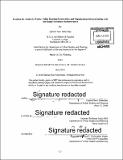| dc.contributor.advisor | Justin Steil. | en_US |
| dc.contributor.author | Silberblatt, Gabriel Perri | en_US |
| dc.contributor.other | Massachusetts Institute of Technology. Department of Urban Studies and Planning. | en_US |
| dc.date.accessioned | 2016-10-25T19:50:42Z | |
| dc.date.available | 2016-10-25T19:50:42Z | |
| dc.date.copyright | 2016 | en_US |
| dc.date.issued | 2016 | en_US |
| dc.identifier.uri | http://hdl.handle.net/1721.1/105038 | |
| dc.description | Thesis: M.C.P., Massachusetts Institute of Technology, Department of Urban Studies and Planning, 2016. | en_US |
| dc.description | Cataloged from PDF version of thesis. | en_US |
| dc.description | Includes bibliographical references (pages 68-72). | en_US |
| dc.description.abstract | The Rental Assistance Demonstration ("RAD") program is a controversial federal effort to address public housing's financial crisis by opening it up to private investment and recapitalization; in essence, to mortgage public housing in order to save it. While some high profile examples of RAD's implementation have confirmed critics' fears about the loss of public control over a critical social safety net, other public housing authorities ("PHAs") have begun to use the program to empower themselves and ensure the financial stability and health of their entire portfolios. Since the program's pilot period began in 2012 at least three typologies of RAD implementation have emerged, each with their own unique outcomes and impact on PHA operation. This thesis investigates the organizational implications for the most challenging of these approaches, the "All-In" strategy, in which PHAs comprehensively address the capital needs of their entire portfolio while retaining the maximum degree of control over the process through in-house development. While RAD's use of private financing strategies is not new to public housing, the pressure on "All-In" PHAs to structurally internalize some private-sector models is a significant development for the organization and management of public housing. Case studies from Cambridge, MA and Tacoma, WA offer evidence of the unique challenges, emergent adaptations, and strategic opportunities for two "All-In" RAD agencies. The thesis describes the pressure on these PHAs to shift from a functional and hierarchical bureaucratic model to a flatter, more decentralized organizational structure and discusses some managerial strategies and tools public sector managers can use to navigate this transformation. | en_US |
| dc.description.statementofresponsibility | by Gabriel Perri Silberblatt. | en_US |
| dc.format.extent | 72 pages | en_US |
| dc.language.iso | eng | en_US |
| dc.publisher | Massachusetts Institute of Technology | en_US |
| dc.rights | M.I.T. theses are protected by copyright. They may be viewed from this source for any purpose, but reproduction or distribution in any format is prohibited without written permission. See provided URL for inquiries about permission. | en_US |
| dc.rights.uri | http://dspace.mit.edu/handle/1721.1/7582 | en_US |
| dc.subject | Urban Studies and Planning. | en_US |
| dc.title | Keeping the authority public : public housing preservation and organizational restructuring with the Rental Assistance Demonstration | en_US |
| dc.title.alternative | Public housing preservation and organizational restructuring with the RAD | en_US |
| dc.type | Thesis | en_US |
| dc.description.degree | M.C.P. | en_US |
| dc.contributor.department | Massachusetts Institute of Technology. Department of Urban Studies and Planning | |
| dc.identifier.oclc | 959709773 | en_US |
